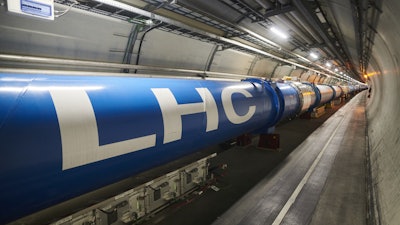
BERLIN (AP) — The world's biggest particle accelerator restarted on Friday after a break of more than three years for upgrading and maintenance work.
The 27-kilometer (17-mile) Large Hadron Collider, located under a Swiss-French border area near Geneva, is perhaps best known for helping confirm the subatomic Higgs boson in 2012.
The European Organization for Nuclear Research, or CERN, said that two beams of protons circulated in opposite directions around the accelerator on Friday, but high-intensity, high-energy collisions are still a couple of months away.
It is the collider's third run. A first round of experiments took place from 2010 to 2012, and a second from 2015 to 2018. This round is expected to last until 2026.
“The machines and facilities underwent major upgrades during the second long shutdown of CERN’s accelerator complex,” CERN's director for accelerators and technology, Mike Lamont, said in a statement.
He added that the collider “will now operate at an even higher energy” and deliver significantly more data.





















